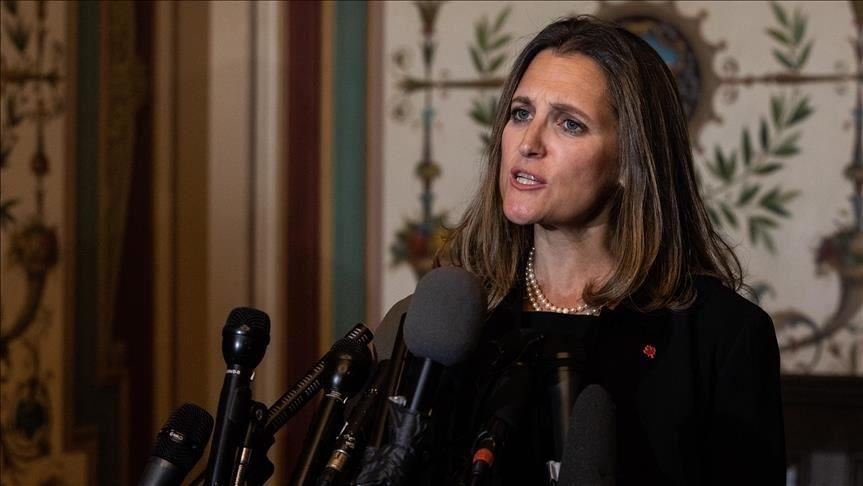Tensions still high between Canada, Saudi Arabia
Call to ‘immediately release’ human rights activists enrages Saudi government
 Chrystia Freeland
Chrystia Freeland
TRENTON, Canada
When former Canadian Foreign Minister Chrystia Freeland tweeted that Saudi Arabia should “immediately release” imprisoned rights activists, no one could have foreseen the diplomatic desert storm that followed.
The Saudis did more than kick sand in Canada’s face – they buried the government under a virtual dune.
In short, while a significant number of countries found the reaction egregious, the Saudis were enraged because in their mind, Canada had crossed a line drawn in the sand, and the Kingdom saw the tweet as an interference in its internal affairs. And it was those two words -- “immediately release” -- contained in a tweet by Canada’s Global Affairs Ministry that sent the Kingdom’s government under Crown Prince Mohammed bin Salman – known as MBS – over the edge.
“Canada is gravely concerned about additional arrests of civil society and women’s rights activists in #SaudiArabia, including Samar Badawi,” the tweet said. “We urge the Saudi authorities to immediately release them and all other peaceful #humanrights activists.”
The tweet was a follow-up to Canada’s years-long call for the Saudis to release Samar Badawi’s brother Raif, who has languished in a Kingdom prison for seven years. His wife and children live in Montreal. Badawi, a blogger, was convicted in 2013 of “insulting Islam through electronic channels.”
Canada had been quietly and out of the public spotlight urging the Saudis to release Raif for years, as had other countries. But the social media criticism was apparently too much.
The tweet was posted on Aug. 3, 2018, but the repercussions are still being felt today.
The Saudis reacted quickly, saying in a statement by its Foreign Affairs Ministry that the use of “immediately release” was “unfortunate, reprehensible and unacceptable in relations between states.”
In frenzied actions, the Saudis expelled the Canadian ambassador, recalled its own, stopped all new trade and investment with Canada and suspended Saudia (formerly Saudi Arabian Airlines) Toronto flights. It also ordered thousands of its students in Canadian schools to leave and attend schools in other countries, a particular blow for Canada, since there were a lot of medical students working in hospitals.
Most of these punitive steps remain in place to this day.
But Freeland, then Canadian foreign minister, said backing down was not an option.
“Let me be very clear…Canada will always stand up for human rights in Canada and around the world,” she said in the wake of the Saudi reprisals.
Canada’s position remains the same.
New Foreign Minister Francois-Philippe Champagne recently said he was going to bring up the continued imprisonment of Raif.
“We remain extremely concerned by the case of Raif Badawi,” the minister’s office said in a reply to an email query by Anadolu Agency. “We have raised it at the highest levels and we have repeatedly called for clemency to be granted.
“As Minister Champagne said (recently), we are extremely concerned by reports that Mr. Badawi has been transferred to solitary confinement and we will raise this concern with the government of Saudi Arabia.”
But the question is will calls from Canada and other countries fall on deaf ears or actually result in positive action?
Kyle Matthews, executive director of the Montreal Institute for Genocide and Human Rights Studies at Concordia University, said in an email interview with Anadolu Agency that the track record is not encouraging, “I am afraid that all attempts to get Raif Badawi freed from Saudi prison have not succeeded yet,” he said.
“With the recent news that Mr. Badawi, a prisoner of conscience, has once again gone on a hunger strike and has been placed in solitary confinement by Saudi prison authorities, it appears that global advocacy campaigns and diplomacy need to be kicked into a higher gear.”
Critics blamed the Canadian tweet about the immediate release as a case of Twitter diplomacy that started the firestorm by Saudi Arabia.
But Matthews said Canada is not at fault.
“The Saudis actually overreacted to the tweet put out in Arabic by the Canadian Embassy,” he said. “While very few countries came to defend Canada’s position in supporting Saudi human rights activists, the subsequent murder of journalist Jamal Khashoggi by a Saudi hit team in Istanbul demonstrated the country’s total disregard for human rights and freedom of expression.”
Khashoggi, a Saudi journalist and Washington Post columnist who was critical of the government in Riyadh, was killed on Oct. 2, 2018, inside the Saudi embassy in Turkey. Some have speculated it was by order of MBS, although five people have been arrested and sentenced to death in the Kingdom.
The lack of support for Canada on the human rights issue shows the world has been negligent in tackling the thorny question of the Kingdom’s actions.
“I think all countries, not just the Western ones, have for the most part turned a blind eye to Saudi Arabia’s human rights record,” Matthews said. “The fact that Saudi Arabia was given permission to host next year’s G20 meeting is a case in point.
“It is not too late, however, to apply pressure on Riyadh, to secure Badawi’s release and to permit him to re-join his family in Canada.”
Anadolu Agency website contains only a portion of the news stories offered to subscribers in the AA News Broadcasting System (HAS), and in summarized form. Please contact us for subscription options.







